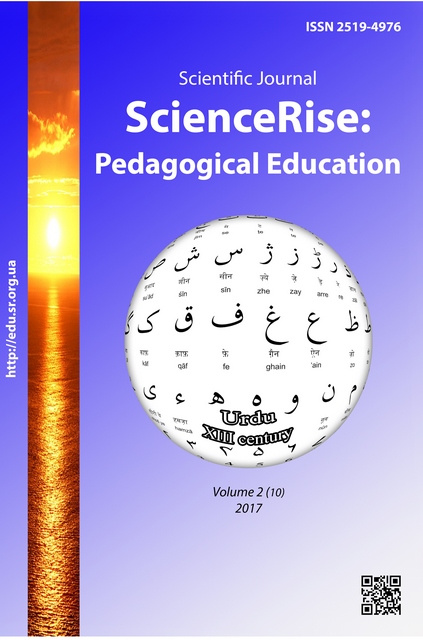Video selection for development of foreign language competence based on implicit specializing of non-linguistic students
DOI:
https://doi.org/10.15587/2519-4984.2017.94233Keywords:
audiovisual implicit specializing, communicative foreign language competence, selection criteria, videoAbstract
The article focuses on developing communicative foreign language competence in monologue production of non-linguistic students at the primary stage of higher education with video. The purpose of the research is to specify video selection criteria for integrated development of socio-cultural and professionally oriented communicative foreign language competence on the basis of audiovisual implicit specializing. The implementation of audiovisual implicit specializing requires: 1) availability of socio-cultural information about culture and language behaviour in different countries of the world with the primary focus on the country and the people of the target language; 2) presence of situational models of communication incorporating a number of lexical units of economic and tourist register in non-professional communication spheres in the video sequence;3) authenticity of academic and non-academic videos; 4) presentation of oral speech production and interaction patterns containing lengthy monologue utterances;5) audio and video correlation in the video sequence as well as correspondence with the first year students’ foreign language proficiency level and their thesaurus. To illustrate the listed criteria the article provides some scripts of video sequences to be used to develop socio-cultural and professionally oriented communicative foreign language competence of non-linguistic students at the primary stage of higher educationReferences
- Bakajeva, G. Je., Borysenko, O. A., Zujenok I. I. et. al. (2005). Programa z anglijskoji movy dlja profesijnogo spilkuvannja [English for Specific Purposes. National Curriculum for Universities]. Kyiv: Lenvit, 119.
- Maksymenko, L. O. (2012). Navchannja profesijno sprjamovanogo anglomovnogo dialogu majbutnih menedzheriv nevyrobnychoji sfery [Teaching Future Managers of Non-production Sphere Professionally Oriented English Dialogue]. Kyiv, 285.
- Met'olkina, O. M. (2012). Formuvannja anglomovnoji profesijno orientovanoji kompetenciji u dialogichnomu movlenni majbutnih mytnykiv [Development of English Professionally Oriented Competence in Dialogue Interaction of Future Customs Officers]. Kyiv, 241.
- Lychko, L. Ja. (2009). Formuvannja u majbutnih menedzheriv-ekonomistiv anglomovnoji profesijno sprjamovanoji competenciji v govorinni [Development of English Professionally Oriented Competence in Speaking of Future Economic Managers]. Kyiv, 257.
- Gannichenko, T. A. (2009). Formuvannja komunikatyvnoji competenciji majbutnih ekonomistiv zasobamy dydaktychnoji gry u procesi movnoji osvity [Development of Communicative Competence of Future Economists by Means of Didactic Play in the Process of Language Learning]. Kherson, 260.
- Miroshnichenko, E. V. (2000). Implicytna profesionalizacija jak zasib intensyfikaciji navchannja anglijskoji movy u nemovnomu (ekonomichnomu) vuzi [Implicit Specializing as Intensifying Means of Teaching English at Non-linguistic (Economic) Higher Educational Institution]. Filologija, pedagogika i psyhologija v antropocentrichnyh paradygmah. Naukovyj visnyk kafedry JuNESKO. Kyiv: KDLU, 3, 566–568.
- Vikovych, R. I. (2012). Metodyka navchannja studentiv movnyh specialnostej audijuvannja anglomovnyh telenovyn [Methodology of Teaching Linguistic Students News Comprehension in English]. Kyiv, 21.
- Kirzhner, S. E. (2009). Navchannja majbutnih jurystiv usnogo profesijno sprjamovanogo anglijskogo monologichnogo movlennja z vykorystannjam avtentychnoji videofonogramy [Teaching Future Lawyers Professionally Oriented English Oral Speech Production with Authentic Video]. Kyiv, 261.
- Konotop, O. S. (2010). Metodyka navchannja majbutnih filologiv anglijskogo dialogichnogo spilkuvannja z vykorystannjam videofonogramy [Methodology of Teaching Future Linguists Oral Speech Interaction in English with Video]. Kyiv, 261.
- Chudak, S. (2010). Arbeit mit Filmen in DaF Unterricht al seine Moglichkeit der Forderung der interkulturellen Kompetenz auf der Fortgeschrittenenstufe. DaF integriert. Literatur – Vedien – Ausbildung. – Gottingen, 73–95.
- Gilmore, A.; Mishan, F., Chambers, A. (Eds.) (2010). Catching Words. Exploiting Film Discourse in the Foreign Language Classroom. Perspectives on Language Learning Materials Development. Oxford: Oxford Univ. Press, 111–148.
- Sherman, J. (2003). Using Authentic Video in the Language Classroom. Cambridge: Cambridge Univ. Press, 277.
- MacGregor, L. (2007). Looking at Cultural Difference in Movie Trailers. Community, Identity, Motivation. Tokyo: JALT, 636–643.
- Sass, A. (2007). Filme im Unterricht – Sehen(d) lernen. Fremdsprache Deutsch, 5–13.
- Nikolajeva, S. Ju. (2010). Cili navchannja inozemnyh mov v aspekti kompetentnisnogo pidhodu [Objectives of Teaching Foreign Languages in the Aspect of Competence Approach]. Foreign Languages, 2, 11–17.
- Jahnjuk, T. O. (2002). Vykorystannja fragmentiv hudozhnih videofilmiv dlja navchannja studentiv movnyh specialnostej sociokulturnoji anglijs'koji leksyky [Teaching Linguistic Students Socio-cultural English Vocabulary with Feature Film Sequences]. Kyiv, 223.
- Bychkova, N. I. (1999). Osnovy vykorystannja videofonogramy ta fonogramy dlja navchannja inozemnyh mov [Basics of Using Video and Audio for Teaching Foreign Languages]. Chep. 1. Kyiv: Vipol, 107.
- Bychkova, N. I. (2006). Novi Strategiji vykorystannja videofonogramy dlja navchannja usnogo inshomovnogo spilkuvannja [New Strategies of Teaching Oral Speech Communication with Video]. Pedagogical Process: Theory and Practice, 3, 69–79.
Downloads
Published
How to Cite
Issue
Section
License
Copyright (c) 2017 Наталія Миколаївна Лутковська

This work is licensed under a Creative Commons Attribution 4.0 International License.
Our journal abides by the Creative Commons CC BY copyright rights and permissions for open access journals.
Authors, who are published in this journal, agree to the following conditions:
1. The authors reserve the right to authorship of the work and pass the first publication right of this work to the journal under the terms of a Creative Commons CC BY, which allows others to freely distribute the published research with the obligatory reference to the authors of the original work and the first publication of the work in this journal.
2. The authors have the right to conclude separate supplement agreements that relate to non-exclusive work distribution in the form in which it has been published by the journal (for example, to upload the work to the online storage of the journal or publish it as part of a monograph), provided that the reference to the first publication of the work in this journal is included.







